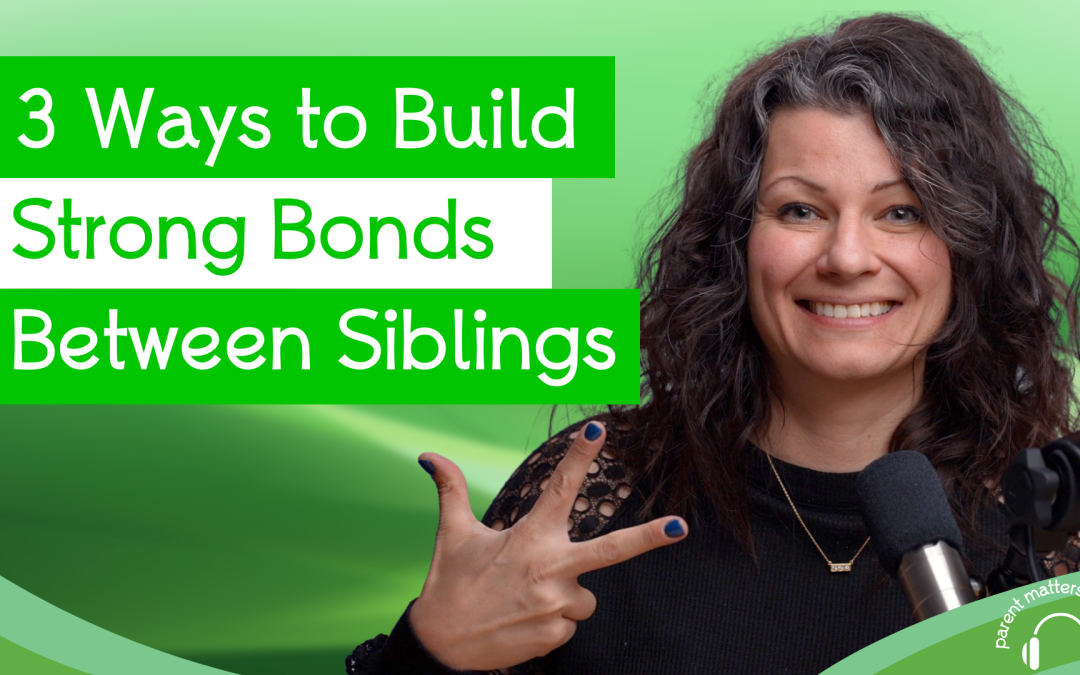DISCLAIMER: The topics discussed in this podcast should be considered a matter of personal opinion. They do not reflect professional advice. If you or your child is in need of mental health counseling support, please search out a licensed counselor.
As much as siblings can bring joy into each other’s lives, they can also bring conflict and rivalry.
Building strong bonds between siblings is a common desire for many parents – I know it is for me. It can be tricky to stay focused on fostering a healthy and supportive family dynamic when kids are screaming at each other and running in 5 different directions for after school activities most days.
But, I want to encourage you to keep working towards building up your kids sibling support and bonds because it can really make a difference in your family today and in the future.
Here are three simple ways I’ve been thinking about how parents can help to create a space to cultivate healthy and collaborative bond between siblings:
1. Encourage Shared Activities
Encouraging shared activities is a wonderful way to bring siblings closer together. It can be as simple as setting the table or helping while cooking a family meal together, riding bikes around the neighborhood, or even engaging in a fun board game night.
These activities create opportunities for siblings to interact positively (or in the case of cooking in my house, try to work collaboratively 🙂), establish common ground, and build lasting memories. By engaging in shared activities, siblings develop a sense of camaraderie and teamwork that will strengthen their bond though working together and being together in the same spaces.
2. Promote Open Communication
Encouraging open and honest communication between siblings can enhance their understanding of one another and facilitate the resolution of conflicts in a peaceful manner.
To promote effective communication, teach your children how to express their feelings and opinions respectfully, and emphasize the significance of active listening. I like to keep a feelings chart handy on the fridge in case it’s hard to put words to feelings. This provides an example of feeling states and if one of my children point to it, another can listen by “seeing” what their sibling is going through.
Here are a few examples of how to encourage communication between siblings:
- Family Meetings: Schedule regular family meetings where everyone can share their thoughts, concerns, and ideas. This provides a platform for open communication and problem-solving as a family.
- Conflict Resolution Techniques: Teach your children strategies for resolving conflicts, such as taking turns speaking, compromising, and finding win-win solutions. Encourage them to brainstorm together and find common ground.
By promoting open communication, siblings will be better equipped to navigate disagreements and build a stronger bond based on understanding and empathy. (And, the amazing thing about practicing open communication at home is that it doesn’t just affect home life, but will begin to trickle out into other areas of life as they practice it at home!)
3. Foster a Sense of Unity
Building strong bonds among siblings is essential for creating a sense of unity within the family. Encourage your children to actively support and celebrate each other’s achievements and successes.
One way that we work on this in my family is to highlight the unique strengths and talents of each sibling, ensuring that every individual feels valued and appreciated.
For example, all three of my children play musical instruments and rivalry often presents during practice times. In those moments my goal is to not take away the challenge aspect of the relationship, but to teach them. I also create space for them to work together by spurring each other on by pointing out strengths and laughing at mistakes before they try fixing it.
This fosters a positive, encouraging and supportive environment for all of us while cultivating working together and avoids many possible hurtful words or stressful interactions.
In addition to emphasizing individual strengths, establishing family traditions can also contribute to a sense of togetherness.
For instance, organizing weekly movie nights where the entire family gathers to watch a film and enjoy snacks can create a shared experience and collaboration. Especially as siblings get older, this can be challenging, like when the movie interests couldn’t be more different – (which I know nothing about 😅)
But having a family movie night means practicing give and take, learning about a sibling’s interests, creating togetherness, and making memories together.
Nurturing a supportive and inclusive atmosphere can help your children develop strong and enduring relationships with their siblings, fostering a sense of unity and love within the family.
By doing so, you are laying the foundation for relationships that start in the home to continue through the years. And my hope is that these relationships are filled with love, support, and understanding between siblings because it was fostered first in their shared home.
Remember, parenting is about progress and helping to cultivate space for our children to learn and grow – even in sibling relationships. And if you find that you need additional support, don’t hesitate to schedule an appointment today. Don’t parent alone.
Don’t have time to watch? You can listen to the full episode below!
Click here to subscribe and be notified when new episodes are released!

Susan Stutzman
Owner | Child Therapist | LCPC, RPT
Parenting is hard! But you don’t have to do it alone. I work with children and parents to resolve emotional conflict, cultivate healing, and nurture hope.
New Clients Call: (855) 586-1802
Current Clients: (855) 543-7687
Ask Us Anything!
We help anxious kids and frustrated parents. We serve Hinsdale & the Western Suburbs of Chicago.
Made with ♥︎ in Hinsdale, Illinois for Chicago
Built By Brand Your Practice.
Kid Matters Counseling, P.C. DISCLAIMER: This website and blog are for informational, educational and general discussion purposes only. It is understood that no guarantee or warranty arises from the information provided, discussed or commented upon in this website and blog nor does it constitute legal or other professional advice on any subject matter. Access to this website and blog is voluntary and at the sole risk of the user. If you think that you have a medical emergency (including clinical), call your doctor or 911 immediately. A licensed medical professional should be consulted for diagnosis and treatment of any and all medical conditions. While the information contained within this website and blog is periodically updated, no guarantee is given that the information provided is correct, complete, and/or up-to-date. See our complete Privacy Policy and Terms of Service.





